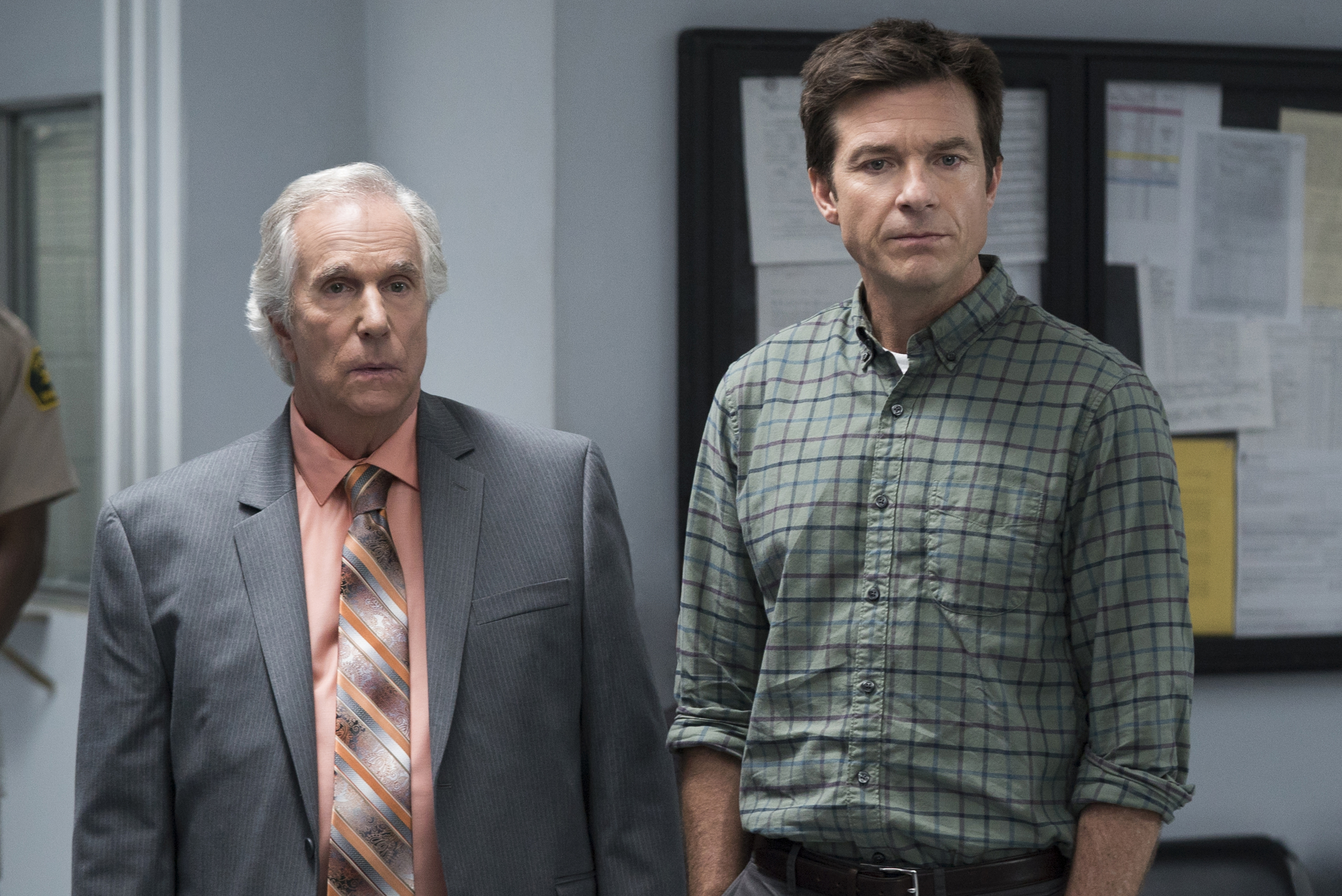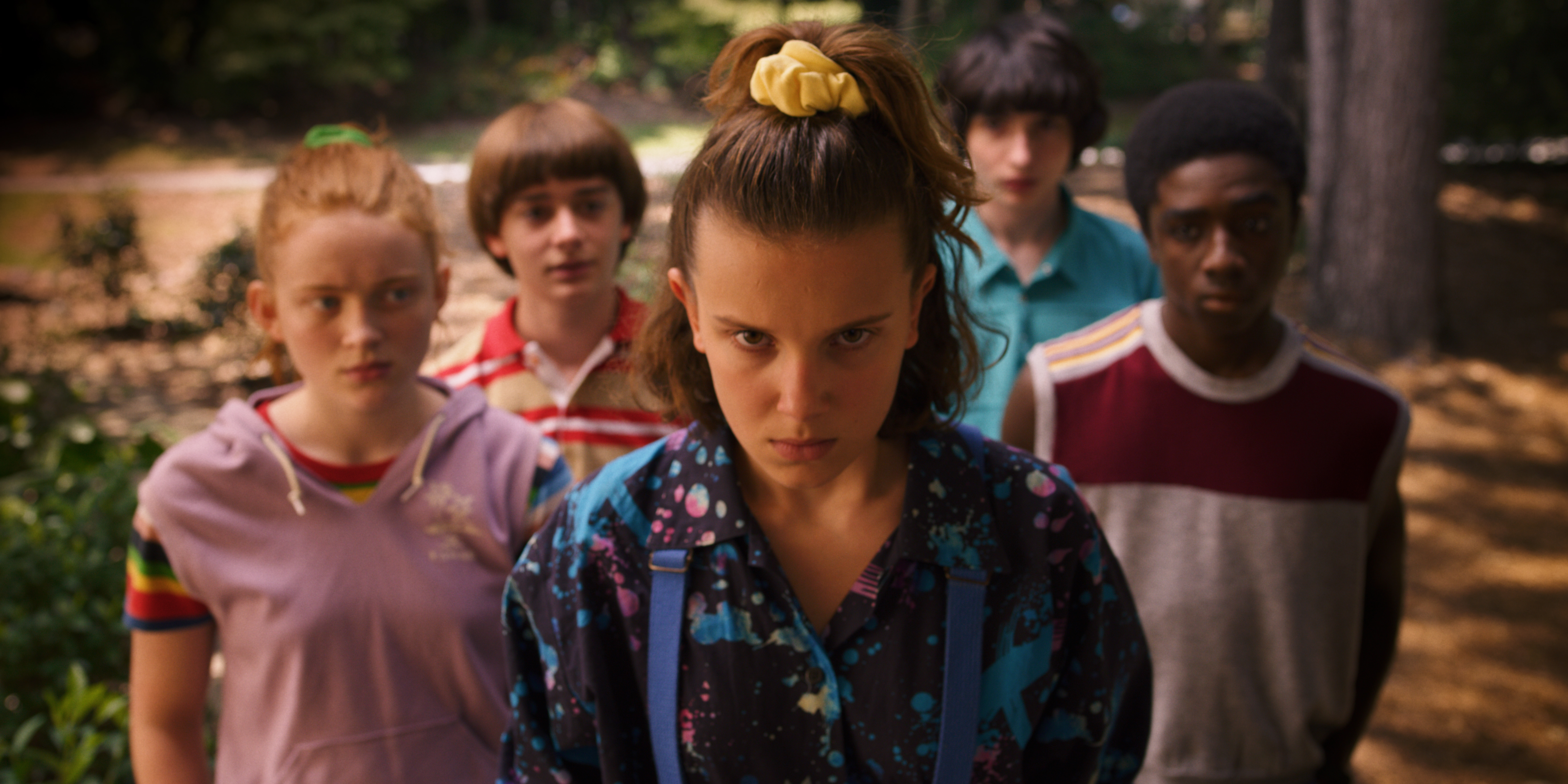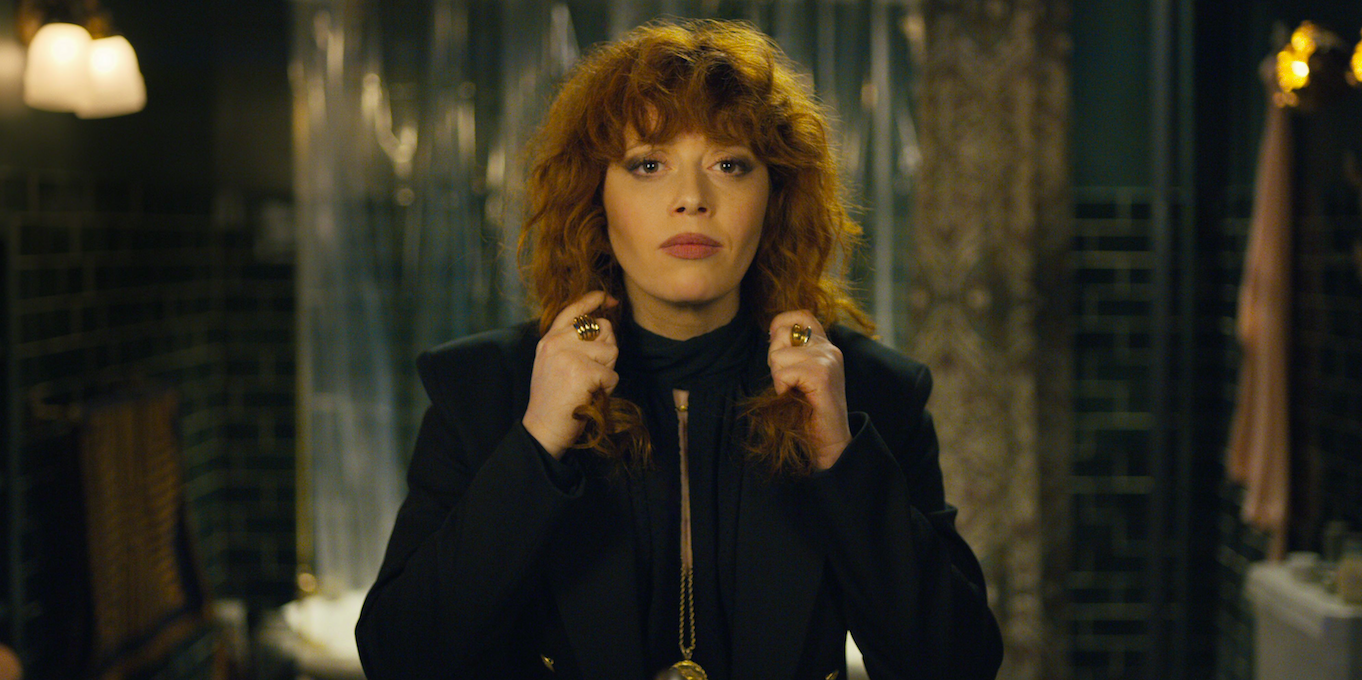Back in May, it was announced that Grey’s Anatomy, Shonda Rhimes’s long-running sexy medical drama, would continue to put their surgeons in life-and-death situations (and the occasional love triangle) for two more seasons. That would guarantee at least 17 seasons of medical mysteries and sex in hospital closets, with no signs of stopping. But here’s the real question: should Grey’s make like Denny and die already?
All too often, networks and showrunners squeeze every bit of juice out of a popular series, refusing to let them die at their peak. They’ll run a whole series into the ground with nonsensical storylines and stagnant character development to get a few more seasons, rather than letting a show end while it’s still good and while viewers still want more.
But there are signs that that could be changing. Most recently, The Good Place creator Mike Schur announced he’d be ending his NBC afterlife dark comedy after its fourth season, saying in a statement, “At times over the past few years we’ve been tempted to go beyond four seasons, but mostly because making this show is a rare, creatively fulfilling joy, and at the end of the day, we don’t want to tread water just because the water is so warm and pleasant.” Amazon’s Fleabag, a British comedy that found a huge following and critical acclaim in the U.S., recently tied up its story after just two seasons. Amazon is trying to persuade series star and creator Phoebe Waller-Bridge to extend the series. Fans can only hope she doesn’t give in.
While Schur and Waller-Bridge are leading a charge towards quality over quantity, too many others let once-beloved shows morph into tiresome filler that ended with a fart rather than a bang. The TV-watchers of VICE have compiled 25 shows that should have ended much sooner. It’s time. They know it, we know it, and our DVRs know it. —Alex Zaragoza
***
Grey’s Anatomy
Series finale: Still running
Should have been: Season 14
There are so many points in Grey’s Anatomy that would have made a tidy ending: the plane crash; when Derek died; when Christina left; the constant bombs and fires. Grey’s has jumped every single possible shark, but the ridiculous events kind of make the series, at this point. I’m glad they happened, if only just to give us more years of this absurd, endless soap. That said, the show has been renewed for seasons 16 and 17, and one has to ask: What else can even happen at this point? What if it had ended with season 14? In that season’s finale, we got two weddings from couples who’d long suffered through the show’s twists (the admittedly endearing Alex and Jo, and the unexpected Matthew and April). We got a nice life-saving scenario when Bailey and Ben ended up at the wrong wedding, where—of course—the bride’s family went into cardiac arrest. There was even a sneaky (and very Grey‘s) sex romp in a shed. It would have been exactly the sappy, sentimental end we’d expect from such a dramatic show. —Bettina Makalintal

Photo credit: HBO
Big Little Lies
Series Finale: Season 3 likely coming
Should Have Been: Season 1
Stacked with a cast of Hollywood’s heavyweights (Kidman! Witherspoon! Dern!) and talented up-and-comers (Kravitz! Woodley!), the series—based on Liane Moriarty’s bestseller—crushed it its first season, as the Monterey mom squad tells lies of varying size and severity, both to themselves, their partners, and eventually the authorities. It was a decadently enthralling and often gruesome look at marriage, abuse, and trauma, ending with the “Monterey Five,” as they’d come to be known, killing an abuser and seemingly getting away with it. Naturally, with its success came the hordes wanting a season two. It was delivered on June 9, 2019, with the addition of the heaviest of all Hollywood heavyweights—Meryl Streep. What could have been a continuation of the richly layered story of these five women became a meandering soap with a few gifable moments thanks to Dern and Streep. They should’ve just let them have their post-murder, softly filtered beach day and ended it there, but noooo. With another season likely coming, as season 2 ended with the five entering the police station, we’ll see if BLL can find its stride again. —Alex Zaragoza
Mad Men
Series finale: Season 7 (aired May 2015)
Should have been: Season 5 (with some changes)
The actual series finale of Mad Men was perfect, but the two seasons leading up to it were totally off the rails, yet somehow still kind of boring—perhaps fitting for a (granted, very good) show that’s about, uh, a bunch of white people in advertising. What was all that shit with Bob Benson, that so-goody-two-shoes-he-was-sinister brown-noser? They got us all worked up about him in season six, then didn’t even make him a serial killer or anything fun like that. Do we even remember Pete’s affair? Megan’s miscarriage? They pale in comparison to the sexy, slow-burn drama of the first five seasons. At the end of season five, Don Draper should have turned out to be DB Cooper, Peggy should have stuck with Abe, and everyone else should have moved to a hippie commune or something. —Hilary Pollack
The O.C.
Series finale: Season 4 (aired Feb. 22, 2007)
Should have been: Season 3
The first two seasons of The O.C. were some of the best television of the aughts—or ever. What the Orange County-set show lacked in originality (a teen show about a good girl and a bad boy? And the bad boy is taken in by a rich family? Never heard that one before…) and diversity, it made up for in spades with witty writing, nuanced characters, a dope soundtrack, and sky-high entertainment value. The flaws of its protagonists were part of what made its cast come to life, and Marissa Cooper (Mischa Barton)—despite being a depressive brat—was crucial to its dynamic. Once they killed her off at the end of the third season, we suddenly realized that we actually don’t need another entire season of Seth and Summer bickering, Ryan continuing to pick duds as his post-Marissa romantic interests, and Sandy and Ryan continuing to prove that marriage is all about weathering the storm, or something like that. Killing Marissa in a fiery car crash would have been a perfect decision if they had stopped right then and there. —HP
Dexter
Series Finale: Season 8 (aired Sep. 22, 2013)
Should Have Been: Season 4
One of the main thematic threads of Showtime’s tragicomic serial killer drama Dexter was the idea that violence is cyclical: that traumas are borne out across generations; that children must pay for the sins of their fathers. But that message is conveyed clearly and movingly enough in the early run of the show, before the incredibly on-the-nose moment when Michael C. Hall’s titular character finds his child playing in a pool of his wife’s blood, just after it seemed that the killer of killers was finally going to leave Florida and escape the life that his own father had set him up for. The show never really figured out what to do without Dexter’s love interest Rita as a moral center for him to return to, and in the seasons after it ratcheted up the intensity of its Big Bads until they became comic book villains (Season 6 is especially eye-rolly, casting Colin Hanks as a religious fanatic with a penchant for disemboweling people in ways evoking the Book of Revelation.) Also, if you allow Dexter his happy ending moments before the close of Season 4, you avoid the incest plotline, which is always good. —Colin Joyce
Skins (UK)
Series finale: Season 7 (aired Aug. 5, 2013)
Should have been: Season 2
Over 11 years, MGMT’s seminal work “Time to Pretend” has been used in dozens of video games, commercials, and trailers, but undoubtedly its most perfect usage was the end of Skins season two, which should have absolutely been the show’s finale. After two seasons of death and loss on the drug-addled British teenage drama, the original UK version of the episode “Final Goodbyes” culminates in stoner Sid (Mike Bailey) flying across the Atlantic to go after manic pixie dream girl Cassie (Hannah Murray), and making his way through New York as “Time to Pretend” plays; it’s frantic, sad, and hopeful all at the same time. The episode’s very final shot is a direct callback to the show’s first, save for a character swap. If everything had stopped there, Skins would have been the most perfect circle, without the nonsensical shitshow of gangs, evil psychiatrists, and insider trading that came in the following five seasons—and don’t even get me started on the American reboot. —BM
Monday Night Raw
Series finale: Still airing
Should have been: January 4, 1999
Before the WWE got the “F” out of their name and grew into a publicly traded company with ties to Trump, the Saudi Royal family, and the mayor of Knoxville, Tennessee, its ratings peaked during the more violent and sexually explicit Attitude Era. It was a period best known for the rise of wrestlers like “Stone Cold” Steve Austin and The Rock, but its greatest moment (and the should-be series finale) starred Mick Foley, a sweatpants-wearing underdog best known for being thrown through a table. The definitive Attitude Era championship match headlined a 1999 episode of Monday Night Raw—a 9-minute, no-disqualification brawl. Just as The Rock was about to retain his title with the help of generous outside interference, Austin’s glass shattered to what was likely the loudest crowd pop in wrestling history. He cracked a chair over The Rock’s head (an unthinkable move today) and draped Foley over him for his first, unlikely title win. If Monday Night Raw had ended that fateful night in 1999, the villainous Rock wouldn’t have stolen the belt back three weeks later, Linda McMahon might not have a cabinet seat, and Gawker might still be a website. —Aaron Shapiro

Photo credit: Saeed Adyani/Netflix
Arrested Development
Series finale: Still running? Maybe?
Should have been: Season 2
I refuse to acknowledge seasons four and five of Arrested Development, and, if we’re honest, the majority of season three is dicey too. The ableist plot involving Charlize Theron as a “mentally retarded female” is questionable for sure, as are adopted son Annyong’s lowkey racist deportation and spying storylines. Arrested Development should have ended with its second season, when the show was absolutely at its peak. The first two seasons are near perfect, with jokes so layered that they get better with every rewatch, plus hilariously awkward plotlines, like Tobias’s Mrs. Featherbottom, his obsession with the Blue Man Group, and the cringey romance between first cousins Maeby and George Michael. At the end of season two, the cousins kiss, the model home collapses around them, and the Bluth family fights outside a courthouse. The show is weird; that would have been a fittingly weird finale, and we would have skipped all the bad things that happened thereafter. —BM
Girls
Series finale: Season 6 (aired April 16, 2017)
Should have been: Season 4
Girls splashed into the TV world in 2012, promising to portray millennial life in New York City as realistically as possible. But creator Lena Dunham might’ve taken that too far in some ways, following the main characters through their twenties at a glacial pace that practically mimicked real time, while whiffing in others, like that the show’s version of New York seemed to be entirely missing people of color. By the final season, it became frustrating to watch characters struggle with the same flaws—like Marnie Michaels’s narcissism—they’d been battling since the beginning. When the main characters start to drift apart and Shoshanna decides she doesn’t need to be friends with the other three leads it is, again, pretty realistic. But no one really wants the main characters of a landmark TV show to stop being friends altogether. We really just wanted a compelling show that accurately depicted the lives of young people trying to find their place in the world. Girls nailed that, until it didn’t. —Taylor Hosking
Homeland
Series finale: Still airing
Should have been: Season 4
The first season of Homeland is near-perfect television. It’s a tense and edgy political thriller starring Claire Danes as Carrie Mathison, a CIA agent assigned to the case of Damian Lewis’s Nicholas Brody, a U.S. Marine who was captured and turned by Al Qaeda. Every episode in its early seasons boasts increasingly higher stakes, and it’s a thrilling watch. But after a while, things just continued to escalate without ever settling down. By the time a disjointed season 3 rolled around, Brody was no longer an Al Qaeda operative but stuck in a South American hideout getting hooked on heroin before, confusingly, working with the CIA again. Season 4 managed to bring it all back for what’s arguably the show’s strongest collection of episodes yet, but Homeland never matched its initial peak. —Josh Terry
The Office
Series finale: Season 9 (aired May 15, 2013)
Should have been: Season 5
The Office is undoubtedly one of the most brilliant sitcoms of all time, led by the incomparable Steve Carell as the bumbling, unknowingly offensive Michael Scott. Over the course of its tenure on NBC, the show continued to up the cringe factor, but Pam and Jim’s love story was the heart of the show, as were the good people of Dunder Mifflin. They were just trying to get through their day without being attacked by a bat, hit by a car, or kidnapped and taken to rehab by their boss—and that was just Meredith! Unlike the British series that inspired it, which did two seasons and two Christmas specials, the American version of The Office ballooned into nine unnecessarily long seasons (most seasons had over 22 episodes). While there’s an argument to be made that the show should have ended when Carell left the show towards the end of season 7, it in fact should have ended much sooner. The show started to take a dip around season 5, and while the following four seasons produced some fantastic episodes and moments (Michael falling into the koi pond, the absolutely painful “Scott’s Tots”), the storylines and characters went loopy and got increasingly annoying (Will Ferrell’s brief stint as the new boss, Dunder Mifflin going to Saber). It should have ended at season 5, Michael and Holly should have gotten together once and for all, and the beloved series could have ended on a high note. —AZ

Photo credit: Netflix
Stranger Things
Series finale: Fourth season confirmed
Should have been: Season 2
The third season of Stranger Things, Netflix’s sci-fi darling, raises the question of where and when gleeful pandering to our collective nostalgia starts to surpass the plot itself—and consequently, at what point should the Duffer Brothers, the series creators, call the whole thing off in favor of a tighter ending? Will Byers isn’t the same kid after he’s made it out of the Upside Down at the end of season one, and a follow-up season that finds the gang defeating the Mind Flayer again and closing the gate for good feels organic and warranted. But to reopen that same plot and literally reopen the same portal (even if you can blame Russia this time) automatically lowers the narrative stakes of the show. Sure, it’s fun to see the cast navigating the 80s—teenage lust! Malls! Geopolitical tension! Scrunchies!—but you can only save Hawkins from a flesh-eating demon from another dimension so many times before your previous victories start to lose their emotional impact, even if you kill-but-very-obviously-not-kill a beloved character this time around. Wrapping it up at the Season 2 is generous. —Meredith Balkus
The Wire
Series finale: Season 5 (aired March 8, 2008)
Should have been: Season 4
If The Wire had ended after its flawless fourth season, it would be the greatest series HBO has ever made. To be fair, it’s still the greatest series HBO has ever made—even if that fifth season took the naturalistic series and pushed it deep into screwball territory, complete with ragged cop Jimmy McNulty’s bonkers fake serial killer that feels more like some drunk dream he had after passing out with Bunk at the train tracks than an actual Wire narrative. But all season 5 issues aside, there’s a bigger reason that creator David Simon should have just called the show at that season 4 finale. If the final shot of the series was Namond’s quiet moment while he stared at his new neighborhood, safe and quiet and hopper-free, before going inside for breakfast with Bunny, the show could’ve actually ended with something it had precious little of during its run: hope. —River Donaghey
Family Guy
Series finale: Still airing
Should have been: Your 13th birthday
Remember how it felt to be 12 years old? You were growing, you were changing, and the world was at your fingertips, if by “world” we mean “the newfound joys of masturbation.” Family Guy was still funny. Remember when Peter fought that giant chicken? Oh, how you laughed. But somewhere around your 13th birthday, the laughter waned. Your child brain became a teenage brain, more aware and finely-tuned and able to realize these purposefully offensive and awful jokes are actually just terrible and if you see another stupid aside you will lose your shit for good. Let’s not even get started on Quagmire’s deeply unconscionable sexuality. If you’re too old to crawl into bed with your parents, you’re too old to enjoy Family Guy. Sorry. —RD
Felicity
Series finale: Season 4(aired May 22, 2002)
Should have been: Season 2
Poor Felicity. The series started out strong: bookish, curly-haired Felicity Porter (Keri Russell) impulsively follows her high school crush, Ben, to NYU after he wrote a thoughtful note in her yearbook. And by “strong” I mean somewhat questionable and completely stalker-ish. But 2002 was a different time, and the show’s premise was romantic enough for the teen WB crowd, who was already invested in the verbose high schoolers on Dawson’s Creek. Once the love triangle between Ben, Felicity, and resident advisor Noel got going, things got hotter, albeit in an extremely subdued, Sarah McLachlan-soundtracked sort of way. Then, in season 2, Felicity decides to cut off her long, gorgeous locks in a show of independence and ends up looking like 1999-era Justin Timberlake. Viewers freaked out, ratings took a nosedive, and the hair faux pas became a pop culture punchline. The backlash was ridiculous, and actually pretty abhorrent. Still, the show never quite recovered, and writers made very dumb decisions with the story, like an odd time-jump finale which seemed like a precursor to what would come later from creator J.J. Abrams. They should’ve just taken the L and ended at season 2. —AZ
Lost
Series finale: Season 6 (aired May 23, 2010)
Should have been: Beats me, but not six seasons.
Speaking of J.J. Abrams, his ABC sci-fi drama Lost was a monster in many respects: it boasted a cast of what felt like 400 actors, featured actual “smoke monsters,” and depicted other entities terrorizing the survivors of a plane crash who are stranded on a not-so-deserted island. Its strange, mythological storyline ended with the big reveal that the characters had maybe been in purgatory the whole time(?). It was a ratings beast (the premiere episode of its final season drew 12.1 million viewers). It’s hard to say where Abrams and his partners Damon Lindeloff and Jeffrey Lieber were going with the story, because it went in a million directions, sometimes nonsensically, over its six-season run. By the end, it all became so convoluted with its multiple timelines, twisted allegories, and fantastical character arcs (John Locke becomes the Smoke Monster!) that it was hard to follow. I’m not actually sure where it could have ended, because it’s so intertwined that some storylines wouldn’t be tied up. It just didn’t need to last so long. The story could’ve been less complicated and done in four seasons, and saved us all the trouble of wondering if the Oceanic Six were actually dead the whole time. —AZ
The Handmaid’s Tale
Series finale: Still airing
Should have been: Season 1
Hulu’s dystopian drama, based off Margaret Atwood’s book, came in hot and extremely timely, premiering five months after the election of Donald Trump. The series follows June/Offred (Elisabeth Moss) as she lives as a handmaid in the totalitarian, extremist Christian country of Gilead, where women are stripped of many of their human rights (they are brutally punished for reading, for example) and handmaids are forced to help repopulate the world’s dwindling population in a monthly “ceremony” where they’re raped by commanders in the presence of the commanders’ wives. Women across the globe have taken to protesting in red handmaid robes and white bonnets, particularly when reproductive rights have been attacked. After season 1, the show had to go off-book, choosing to up the horror-factor and become increasingly more race-blind in its storytelling. It should’ve stayed a one-season miniseries instead of an ongoing masochistic nightmare disguised as entertainment. —AZ
Cops
Series finale: Still airing
Should have been: Never in existence
The docuseries premiered in March of 1989, and follows police officers in various cities across the U.S. as they performed their duties. In the show, a camera crew films officers—whose departments have, for the most part, partnered with the producers—as they conduct their daily rounds. There are a lot of questions to be asked about the ethics of portraying people in some of their most vulnerable moments—and questions have been raised about the ethics of the show’s release policy—but fundamentally, a show that glorifies cops while omitting any suggestion of fallibility seems misguided at best. This show should have never happened, and it most definitely shouldn’t still be on when police officers are killing Black and brown people at alarming rates in this country and facing minimal, if any, consequences for it. —AZ

Photo credit: HBO
Game of Thrones
Series finale: Season 8 (aired May 19, 2019)
Should have been: Season 8
There’s an easy case to be made that Game of Thrones should have just stopped when they caught up to George R.R. Martin’s source material, and never gone off-book in season six. The show changed dramatically in the last couple seasons, wrecking the show’s careful pacing and trading out the palace intrigue for interminably long CG action sequences. But there are still some gems in season six and seven. If we’re trying to choose a better ending for the series, there’s no better choice than the season eight episode “A Knight of the Seven Kingdoms.” It’s a perfect return to form for the series, returning to the interpersonal focus that made the early seasons so great. Did we need to actually see the Battle of Winterfell? Did we ever actually see it at all? Give us a nice cliffhanger ending and we’ll be debating whether it means that all the humans actually died, Sopranos-style, for years. At least that’s better than King Bran. —RD
Dawson’s Creek
Series finale: Season 6 (aired May 14, 2003)
Should have been: Season 4
Dawson’s Creek rang in a new era, not just for the former WB network, but for teen soaps as a whole. Building off the earnestness of the short-lived My So-Called Life and Party of Five, the success of Dawson’s Creek led to One Tree Hill, Gilmore Girls, and other late 90s/early-mid 00s dramas revolving around extremely loquacious and eloquent teenagers facing real world (and often first-world) problems. The love rectangle between best friends Dawson and Joey, bad-boy-with-a-heart-of-gold Pacey, and new girl in town Jen was captivating viewing for tweens and teens desperate for an exciting love story in their own lives. But as it goes with high school-set shows, at some point the characters must go off to college. This often leads to the awkward, puberty-esque transition of turning the teens we grew to love into adults. With Dawson’s Creek, the characters were at their most interesting, even if often unlikeable, when they were in high school. They should’ve kept them there, ending the series in season 4 with their graduation, and of course with Pacey and Joey together. No other outcome would’ve been acceptable. —AZ
Gilmore Girls
Series finale: Season 7 (May 15, 2007)
Should have been: Somewhere around season 5
It’s fun now to recall the series finale of Gilmore Girls: Stars Hollow throws Rory a going-away party because she’s accepted a job reporting on then-Senator Barack Obama’s 2008 presidential campaign. When Rory’s mother and grandparents ask how long she’ll be gone she tells them, “It could be two months, it could be two years if Barack does well.” Quaint! Still, it should have never happened, because Gilmore Girls should have ended much sooner. When? I’m not sure. Gilmore Girls peaked in seasons 2 and 3; but unlike other shows of its ilk, it stayed reliably good even when its main character went off to college. Gilmore Girls’ descent really begins somewhere in the middle of season 5, and it’s a slow burn thereafter, culminating in season 7, which was written and produced by a new team following a botched contract negotiation that led the show’s creators to jump ship. Don’t get me wrong: All 153 episodes of the original Gilmore Girls series are precious to me, and I’ll continue watching every one of them until I die in an apocalyptic climate event. But there could be like, 53 fewer. —Marie Solis
House of Cards
Series finale: Season 6 (aired Nov. 2, 2018)
Should have been: Season 5
Even before Netflix cancelled House of Cards amid sexual assault allegations against Kevin Spacey, the show should have ended on merit. At its fifth season, the show just got bad. The premise of House of Cards (i.e., Spacey as politician Frank Underwood who is also a murderer) was never very believable, unless you follow unhinged conspiracy theories. But it made the irredeemable fall from serious drama to absurd soap when wife Claire kills her lover Tom in the middle of… having sex? And then it was back to flexing America’s global power as usual. That said, it was a drama-filled season as Claire and Frank fought for political power, and it resulted in a perfect last scene. Claire breaks the fourth wall and says, “My turn,” and you realize that she’s just as deranged as her husband. Given all the manipulation and meddling we’d seen them both capable of, leaving Claire’s time as President purely in our imaginations would have been much more dramatic—and scary—than seeing it play out in season six. —BM
2 Broke Girls
Series finale: Season 6 (aired April 17, 2017)
Should have been: Probably never
The moment it appeared on 2011 TV screens, CBS’ shockingly cringe attempt at capturing hipster culture and audiences was just bad from the get-go. It follows two twenty-somethings working in a Williamsburg (of course) diner: one a sass-mouth, no-nonsense working class hustler; the other a former rich girl forced into the service industry after her daddy gets mixed up in a Ponzi scheme. They move in together, keep the rich one’s horse as a roommate, start a cupcake business (remember in like, 2008, when everyone was into cupcakes? This was a very long time after that), then start a cupcake t-shirt business (whatever that is), and then, I dunno, other stuff happens. The jokes were cheap and relied on stupid, offensive stereotypes. All in all, it’s the CBS idea of what hipsters are like (so much sass!), and therefore incredibly embarrassing. This show should have never existed, let alone lasted six painful seasons, so I suppose if I have to choose when it should have ended, I would say before it even began. —AZ

Photo credit: Netflix
Russian Doll
Series finale: Season 2 confirmed
Should have been: Season 1
The first season of Russian Doll felt so complete that it could’ve been a day-long movie disguised as an eight-episode Netflix series. Creator and series lead Natasha Lyonne managed to keep the reason for her character Nadia’s repeated deaths under wraps until the final, dramatic reveal, while in retrospect, the clues were hiding in plain sight. In doing so, she created a masterpiece that allows audiences to experience what it feels like to suffer from suppressed demons. The season wrapped up in a neat, satisfying bow. But now that season two is apparently in the works, it’s hard to imagine how Nadia could go through a similar journey again, given all that she’s learned about herself in the first season. And if the show shifts its attention to another main character or an anthology, like writers apparently have considered, it would be hard for them to pull off the same bait and switch mystery. —TH
Orange is the New Black
Series finale: Season 7 (aired July 26, 2019)
Should have been: Season 5
OITNB certainly started off strong, following the story of Piper Chapman as she enters an all-women’s correctional facility after being caught working for a drug runner. The show is based on the real experience of Piper Kerman, a middle-class white woman, which, on a larger sociocultural scale, is telling of whose stories we choose to tell when it comes to things that predominantly affect Black and brown communities. Still, the show was a fun and fascinating look at the lives of incarcerated women, at least for a while. But the show was unable to evolve past Piper’s release, and killing off fan favorite Poussey Washington (Samira Wiley) drew audience and even cast outrage. They should’ve killed off the whole series in season 5, letting Litchfield Penitentiary’s inmates take over the whole damn place. —AZ
Sign up for our newsletter to get the best of VICE delivered to your inbox daily.




















![[Book Review] The Blade Itself (The First Law Trilogy) by Joe Abercrombie](https://bendthekneegot.com/wp-content/uploads/2018/01/1516047103_maxresdefault-218x150.jpg)


















